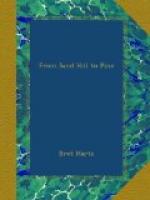“I won’t keep you long,” said the foreman, glancing at the editor’s copy with his habitual half humorous toleration of that work, it being his general conviction that news and advertisements were the only valuable features of a newspaper; “I only wanted to talk to you a minute about makin’ suthin more o’ this yer accident to Colonel Starbottle.”
“Well, we’ve a full report of it in, haven’t we?” said the editor wonderingly. “I have even made an editorial para. about the frequency of these accidents, and called attention to the danger of riding those half broken Spanish mustangs.”
“Yes, ye did that,” said the foreman tolerantly; “but ye see, thar’s some folks around here that allow it warn’t no accident. There’s a heap of them believe that no runaway hoss ever mauled the colonel ez he got mauled.”
“But I heard it from the colonel’s own lips,” said the editor, “and he surely ought to know.”
“He mout know and he moutn’t, and if he did know, he wouldn’t tell,” said the foreman musingly, rubbing his chin with the cleaner side of his arm. “Ye didn’t see him when he was picked up, did ye?”
“No,” said the editor. “Only after the doctor had attended him. Why?”
“Jake Parmlee, ez picked him up outer the ditch, says that he was half choked, and his black silk neck-handkercher was pulled tight around his throat. There was a mark on his nose ez ef some one had tried to gouge out his eye, and his left ear was chawed ez ef he’d bin down in a reg’lar rough-and-tumble clinch.”
“He told me his horse bolted, buck-jumped, threw him, and he lost consciousness,” said the editor positively. “He had no reason for lying, and a man like Starbottle, who carries a Derringer and is a dead shot, would have left his mark on somebody if he’d been attacked.”
“That’s what the boys say is just the reason why he lied. He was took suddent, don’t ye see,—he’d no show—and don’t like to confess it. See? A man like him ain’t goin’ to advertise that he kin be tackled and left senseless and no one else got hurt by it! His political influence would be ruined here!”
The editor was momentarily staggered at this large truth.
“Nonsense!” he said, with a laugh. “Who would attack Colonel Starbottle in that fashion? He might have been shot on sight by some political enemy with whom he had quarreled—but not beaten.”
“S’pose it warn’t no political enemy?” said the foreman doggedly.
“Then who else could it be?” demanded the editor impatiently.
“That’s jest for the press to find out and expose,” returned the foreman, with a significant glance at the editor’s desk. “I reckon that’s whar the ‘Clarion’ ought to come in.”
“In a matter of this kind,” said the editor promptly, “the paper has no business to interfere with a man’s statement. The colonel has a perfect right to his own secret—if there is one, which I very much doubt. But,” he added, in laughing recognition of the half reproachful, half humorous discontent on the foreman’s face, “what dreadful theory have you and the boys got about it—and what do you expect to expose?”




